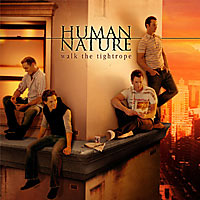
The Bee Gees were a musical group formed in 1958 by brothers Barry, Robin, and Maurice Gibb. The trio were especially successful in popular music in the late 1960s and early 1970s, and later as prominent performers in the disco music era in the mid-to-late 1970s. The group sang recognisable three-part tight harmonies; Robin's clear vibrato lead vocals were a hallmark of their earlier hits, while Barry's R&B falsetto became their signature sound during the mid-to-late 1970s and 1980s. The group wrote all of their own original material, as well as writing and producing several major hits for other artists and have been regarded as one of the most important and influential acts in pop music history. They have been referred to in the media as The Disco Kings, Britain's First Family of Harmony, and The Kings of Dance Music.

Sir Barry Alan Crompton Gibb is a British musician, singer-songwriter and record producer. He rose to worldwide fame as a member of the Bee Gees, one of the most commercially successful groups in the history of popular music. With his younger brothers, fraternal twins Robin and Maurice Gibb, he formed a songwriting partnership beginning in 1955. He has lived in Britain, Australia, and the United States, holding dual UK–US citizenship, the latter since 2009.

Human Nature are an Australian pop vocal group, which formed in 1989, as a quartet featuring Toby Allen, Phil Burton and brothers, Andrew and Mike Tierney. Originally they were established as a doo-wop group, called the 4 Trax, when the members were schoolmates.

One Night Only is a live album and DVD/Blu-ray by the Bee Gees. It features the group's concert at the MGM Grand in Las Vegas in 1997 and includes many of their greatest hits.
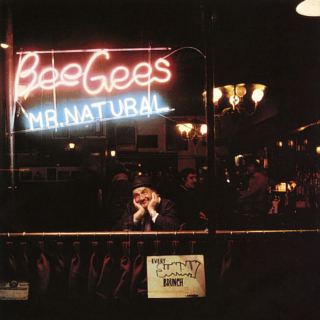
Mr. Natural is the Bee Gees' twelfth album, released in May 1974. It was the first Bee Gees release to be produced by Arif Mardin, who was partially responsible for launching the group's later major success with the follow-up album Main Course. The album's music incorporates more rhythm and blues, soul and funk and hard rock than their previous albums. The cover photograph was taken at 334 West 4th Street, Greenwich Village, New York City by Frank Moscati.

"Night Fever" is a song written and performed by the Bee Gees. It first appeared on the soundtrack to Saturday Night Fever on RSO Records. Producer Robert Stigwood wanted to call the film Saturday Night, but singer Robin Gibb expressed hesitation at the title. Stigwood liked the title Night Fever but was wary of marketing a movie with that name. The song bounded up the Billboard charts while the Bee Gees’ two previous hits from Saturday Night Fever soundtrack were still in the top ten. The record debuted on the Billboard Hot 100 Chart at #76, then leaped up 44 positions to #32. It then moved: 32–17–8–5–2–1. It remained at #1 for eight weeks, and ultimately spent 13 weeks in the top 10. For the first five weeks that "Night Fever" was at #1, "Stayin' Alive" was at #2. Also, for one week in March, Bee Gees related songs held five of the top positions on the Hot 100 chart, and more impressively, four of the top five positions, with "Night Fever" at the top of the list. The B-side of "Night Fever" was a live version of "Down the Road" taken from the Bee Gees 1977 album, Here at Last... Bee Gees... Live.

"Jive Talkin' " is a song by the Bee Gees, released as a single in May 1975 by RSO Records. This was the lead single from the album Main Course and hit number one on the Billboard Hot 100; it also reached the top-five on the UK Singles Chart in the middle of 1975. Largely recognised as the group's "comeback" song, it was their first US top-10 hit since "How Can You Mend a Broken Heart" (1971).
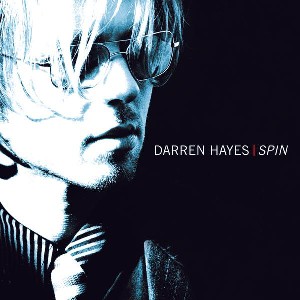
Spin is the first solo album released by former Savage Garden member Darren Hayes. The album was produced by Walter Afanasieff and mixed by Chris Lord-Alge. It was released in Australia in March 2002 and reached the rest of the world later that year.
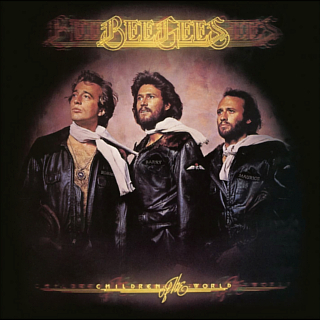
Children of the World is a 1976 album by the Bee Gees. The first single, "You Should Be Dancing", went to No. 1 in the US and Canada, and was a top ten hit in numerous other territories. It was the group's fourteenth album. The album was re-issued on CD by Reprise Records and Rhino Records in 2006. This was the first record featuring the Gibb-Galuten-Richardson production team which would have many successful collaborations in the following years.

"You Should Be Dancing" is a song by the Bee Gees, from the album Children of the World, released in 1976. It hit No. 1 for one week on the American Billboard Hot 100, No. 1 for seven weeks on the US Hot Dance Club Play chart, and in September the same year, reached No. 5 on the UK Singles Chart. The song also peaked at No. 4 on the Billboard Soul chart. It was this song that first launched the Bee Gees into disco. It was also the only track from the group to top the dance chart.

Their Greatest Hits: The Record is the career retrospective greatest hits album by the Bee Gees, released on UTV Records and Polydor in November 2001 as HDCD. The album includes 40 tracks spanning over 35 years of music. Four of the songs were new recordings of classic Gibb compositions originally recorded by other artists, including "Emotion", "Heartbreaker", "Islands in the Stream", and "Immortality". It also features the Barry Gibb duet with Barbra Streisand, "Guilty", which originally appeared on Streisand's 1980 album of the same name. It is currently out of print and has been supplanted by another compilation, The Ultimate Bee Gees.
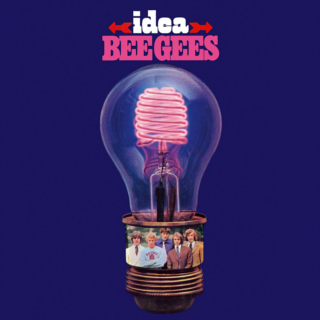
Idea is the fifth album by the Bee Gees. Released in September 1968, the album sold over a million copies worldwide. The album was issued in both mono and stereo pressings in the UK. The artwork on the Polydor release designed by Wolfgang Heilemann featured a "beehive" neon lightbulb with a group photo in its base, while the North American ATCO release designed by Klaus Voormann featured a composite head made from each band member. It was their third internationally released album - the first two albums being released only in the Australian market.

Living Eyes is the Bee Gees' sixteenth original album, released in 1981. The album featured more of a soft rock sound compared to the disco and R&B of their mid-to-late 1970s work. It was also the band's final album on RSO Records, which would be absorbed into Polydor and subsequently discontinued. While it did not sell well in either the UK or the US, the album itself was a top 40 hit in the majority of territories in which it saw wide release.

One is the Bee Gees' eighteenth studio album, released in April 1989.

"How Deep Is Your Love" is a pop ballad written and recorded by the Bee Gees in 1977 and released as a single in September of that year. It was ultimately used as part of the soundtrack to the film Saturday Night Fever. It was a number-three hit in the United Kingdom and Australia. In the United States, it topped the Billboard Hot 100 on 24 December 1977 and stayed in the Top 10 for 17 weeks. It spent six weeks atop the US adult contemporary chart. It is listed at No. 27 on Billboard's All Time Top 100. Alongside "Stayin' Alive" and "Night Fever", it is one of the group's three tracks on the list. The song was covered by Take That for their 1996 Greatest Hits album, reaching No. 1 on the UK Singles Chart for three weeks.

"How Can You Mend a Broken Heart" is a song released by the Bee Gees in 1971. It was written by Barry and Robin Gibb and was the first single on the group's 1971 album Trafalgar. It was their first US No. 1 single and also reached No. 1 in Cashbox magazine for two weeks.
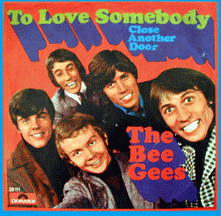
"To Love Somebody" is a song written by Barry and Robin Gibb. Produced by Robert Stigwood, it was the second single released by the Bee Gees from their international debut album, Bee Gees 1st, in 1967. The single reached No. 17 in the United States and No. 41 in the United Kingdom. The song's B-side was "Close Another Door". The single was reissued in 1980 on RSO Records with "How Can You Mend a Broken Heart" as its flipside. The song ranked at number 94 on NME magazine's "100 Best Tracks of the Sixties". It was a minor hit in the UK and France. It reached the top 20 in the US. It reached the top 10 in Canada.

"Guilty" is a vocal duet between Barbra Streisand and Barry Gibb. The song was written by all three Bee Gees: Barry, Robin & Maurice Gibb. Released as a single from Streisand's 1980 album of the same name. "Guilty" peaked at No. 3 on the US Billboard Hot 100 chart and No. 5 on the adult contemporary chart. In the UK, the song reached No. 34 on the UK Singles Chart. The single was certified gold by the RIAA. In addition, "Guilty" won a Grammy Award in the category Best Pop Vocal Performance, Duo or Group. The song also appeared on the 2001 Bee Gees compilation, Their Greatest Hits: The Record.

Bee Gees' 1st is the third studio album by English group Bee Gees, and their first international full-length recording after two albums distributed only in Australia and New Zealand. Bee Gees' 1st was the group's debut album for the UK Polydor label, and for the US Atco label. Bee Gees 1st was released on 14 July 1967 in the UK. On 9 August it entered the UK charts; on that same day, the album was released in the US, and it entered the US charts on 26 August.

"When You Say You Love Me" is a song by Australian vocal group Human Nature, released as the first single from their fourth studio album, Walk the Tightrope (2004). It was written by Darren Hayes from Savage Garden and Rick Nowels, who also produced the track. The song was originally recorded in 2003 by Clay Aiken for his album Measure of a Man. Released on 12 April 2004, the song peaked at number seven in Australia.
